Find out whether diesel engines can be used with kerosene, its dangers, advantages and technical factors. Get the knowledge of the fuel compatibility, engine safety and legal issues with the help of logistics professionals.
As the cost of diesel fuel continues to rise and fall and there are also other challenges like cold weather that affects the performance of the engines, most vehicle owners as well as logistics professionals are left wondering whether kerosene can be an alternative to the traditional diesel fuel. This technical overview looks into the technical feasibility, advantages, risks and practical issues involved with kerosene in diesel engines operation.
Understanding Kerosene as a Fuel Source
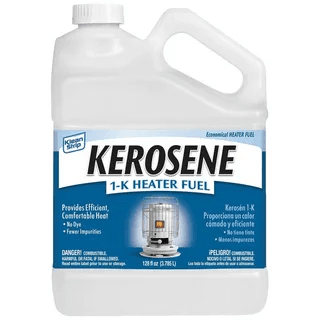
Kerosene is one of the hydrocarbon liquids made based on petroleum, which enjoys more than one hundred years of a history of use as fuel in various applications. Kerosene was originally used to be lit and heat, which is why it has some similar chemical characteristics with diesel fuel being a possible alternative, depending on the situation.
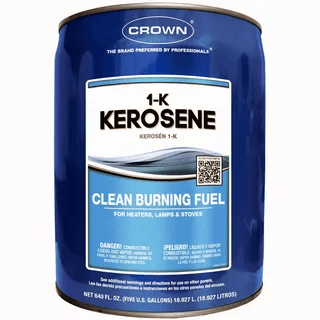
Chemical structure of kerosene contains lighter hydrocarbons in comparison to diesel fuel and a flash point of about 38 C 100F and a freezing point of-40 C (-40F). These attributes add to the varied burning rates and performance attributes that it has when it is employed in a diesel engine.
How Kerosene Compares to Diesel Fuel
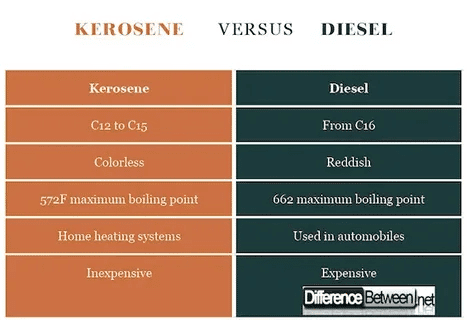
Chemical Differences
Both kerosene and diesel are products of crude oil that is petroleum and different processes of refinement are done. The refining of kerosene occurs earlier because it has a lighter and more volatile fuel compared to that of jet fuel with a higher boiling point. Although diesel is normally colored reddish, kerosene is colorless and is less viscous.

Combustion Properties
Kerosene has some important differences to diesel fuel in combustion properties. Kerosene has a different burn temperature to that of diesel, which influences engine performance, as well as efficiency. This is a reduced combustion temperature that forms part of kerosene benefit on cold weather conditions but also results in less power production.
Technical Feasibility: Can Diesel Engines Run on Kerosene?
The long and short answer is yes, technically more diesel engines can be run using kerosene. The ability is however, highly dependent on the engine design, age, and specification. Certain manufacturers have particular designs of engines which can prove to accept alternative fuel such as kerosene whilst others might end up having problems in their operations or damages.
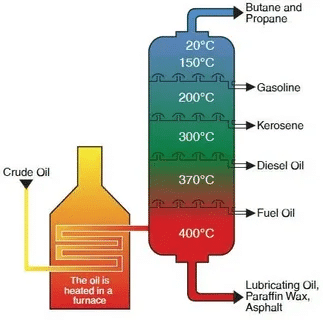
Modern-day diesel engines possess a very sophisticated weighting on fuel injection mechanisms as well as on fabric qualities to get the engine going. These systems could be impacted by the reduced viscosity and disparities in lubrication characteristics of kerosene, which may pose severe harm to them over the long-term in the event of improper governance.
Benefits of Using Kerosene in Diesel Engines
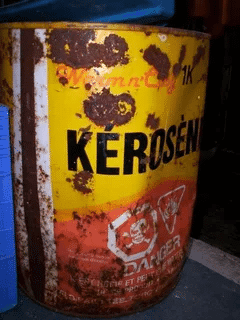
Cost Advantages
The first among the reasons that will make someone think of kerosene is its consistency in being cheaper than diesel fuel. Even modest cost savings per gallon can be turned into substantial savings in terms of cost incursion in the long run in businesses that deal with large fleet or heavy machinery. This is a benefit that is especially appealing to the logistics company, such as GWT Worldwide, that also operates a large transportation system and would need to invest large volumes of fuel.
Cold Weather Performance
The high cold weather characteristic feature of kerosene is attractive in operations in the northern locations. Problems of the fuel system that often occur to a diesel engine when the outside conditions are cold can be avoided by using the fuel which has a lower freezing point and a tendency to gel is less as compared to the diesel fuel. The strength is particularly significant in case of international freight business, which needs to be consistent with varying climates.
Availability and Storage
Kerosene can possibly be readily available in some regions or emergency cases after the difficulties using diesel fuel. It can be used as an effective alternate source of fuel because of its long shelf life and characteristics that makes it easy to store, especially during emergencies.
Significant Risks and Drawbacks

Inadequate Lubrication Properties
Somewhat the most essential reservations of kerosene usage in diesel engines are its disadvantageous lubricating properties. Diesel fuel contains inherent lubricity to fuel injection pumps and other parts of the fuel system. Kerosene does not share these features; therefore, it may arrive at premature downsizing, spoil fuel injection machinery, and lead to expensive service.
Reduced Engine Performance
A lower energy content and the temperature of the combustion of kerosene leads to power reduction and low fuel efficiency of the engine. This decrease in capacity may be especially troublesome in freight transporting services where on time delivery and freight capacities play a critical role.
Potential Engine Damage
Different types of damages might be imposed by the use of kerosene in engines not manufactured to the use of the type of fuel and these may range to wear of parts in the fuel system and seals as well as those related to the combustion chamber. These problems might not be noticeable at the first sight but cause costly repairs and unforeseen outages.
Warranty Implications
Engine manufacturers such as most of the manufacturers expressly forbid usage of non-approved fuels in their engines one of the fuel is the kerosene. It might negate warranty coverage and operators would be at financial risk of damages and performance problems in case of using kerosene.
Legal and Regulatory Considerations
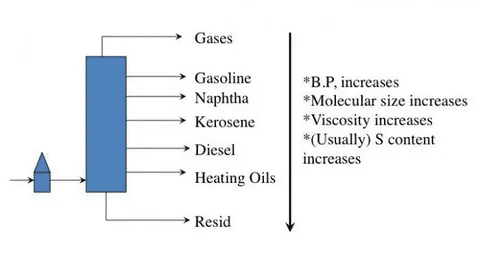
Road Use Restrictions
The use of untaxed and non-authorized fuel on the streets is also unlawful in most jurisdictions such as Canada and the United States. The kerosene that is meant to be used to heat up or in industrial activities is not taxed or regulated in the way it is made to come out as road vehicles. Failure to observe the policies may attract huge fines and legal issues.
Environmental Regulations
Eco-regulations on vehicle emissions and fuels can either forbid the usage of some types of kerosene in road vehicles. These regulations are in place so that they can help in the standardization of the air quality and also cutting down of dangerous emissions within the transportation sector.
International Trade Implications
In the case of overseas shipping companies such as GWT Worldwide, the non-standard fuels may add complications to customs clearance, insurance protection, and navigation of regulations of international transportation in various nations.
Professional Recommendations and Best Practices

Manufacturer Approval
Check the manufacturer specification of the engine, and their list of approved fuels before any thought of using kerosene as an alternative fuel. Consumers must understand that some manufacturers inform them of the specific guidelines in using the alternative fuel and what changes they need to make in their cars or what additions they must make.
Proper Fuel Management
When the use of kerosene is tested and certified to be used on your particular engine, then fuel management is of crucial importance. It consists of applying the correct type of lubricating additives, ensuring that the fuel system is clean and engine performance should be monitored carefully.
Winter Fuel Alternatives
Rather than using kerosene to operate during the cold weather, how about looking at the clearance of winter fuel additives, fuel conditioners as well as the cold weather sustaining cleaning procedures. These alternative sources of protection during winter have no associated risks that are experienced when using kerosene.
Impact on Logistics Operations
Fuel options play a notable role regarding operational efficiency and cost control in case of logistics service suppliers that provide international freight forwarding and supply chain services. The utilization of alternative fuels such as kerosene should be incorporated by not only keeping in mind immediate cost-saving but also its reliability, maintenance, and regulatory conformance in the international routes in the long run.
In the logistics businesses, cost optimisation should go hand in hand with operational reliability, especially in a situation where firms handle time-sensitive goods and ensure customers are satisfied. The risk of engine issues or legal problems with using non-certified fuels may be much more serious than the short-term economic likes.
Conclusion
Although diesel could actually operate on kerosene, it comes with huge dangers which usually exceed the anticipated advantages. Poor lubrication, low powered engines, damages to the engine, the problem of warranty, and the rule of the law makes it worthwhile to use kerosene as a long term alternative of diesel fuel in most cases.
In the case of the companies that work in the logistics and transportation industry, it is imperative to ensure that their operations are reliable so that the company can strive to obtain success. The saving in fuel expenses, which results when the kerosene is used, is usually out-weighed by the cost that might end up incurring due to damages to the engine, legal, and also due to lack of operation.

